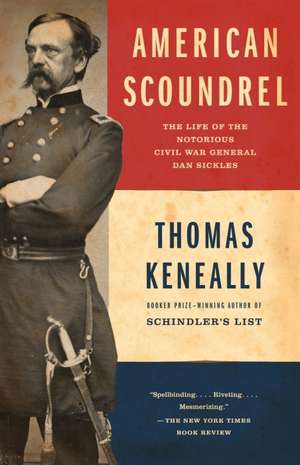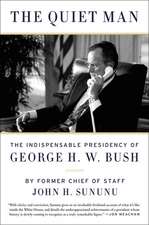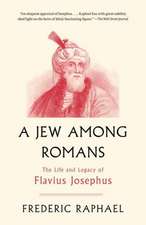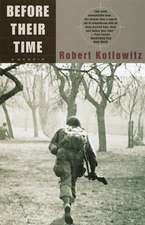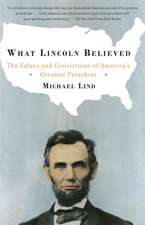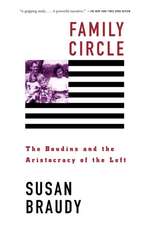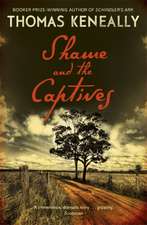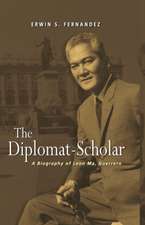American Scoundrel
Autor Thomas Keneallyen Limba Engleză Paperback – 30 apr 2003
Dan Sickles was a member of Congress, led a controversial charge at Gettysburg, and had an affair with the deposed Queen of Spain—among many other women. But the most startling of his many exploits was his murder of Philip Barton Key (son of Francis Scott Key), the lover of his long-suffering and neglected wife, Teresa. The affair, the crime, and the trial contained all the ingredients of melodrama needed to ensure that it was the scandal of the age. At the trial’s end, Sickles was acquitted and hardly chastened. His life, in which outrage and accomplishment had equal force, is a compelling American tale, told with the skill of a master narrative.
Preț: 109.73 lei
Nou
Puncte Express: 165
Preț estimativ în valută:
20.100€ • 21.98$ • 17.37£
20.100€ • 21.98$ • 17.37£
Carte tipărită la comandă
Livrare economică 05-19 aprilie
Preluare comenzi: 021 569.72.76
Specificații
ISBN-13: 9780385722254
ISBN-10: 0385722257
Pagini: 416
Dimensiuni: 135 x 204 x 24 mm
Greutate: 0.3 kg
Editura: Anchor Books
ISBN-10: 0385722257
Pagini: 416
Dimensiuni: 135 x 204 x 24 mm
Greutate: 0.3 kg
Editura: Anchor Books
Notă biografică
Thomas Keneally has won international acclaim for his novels Schindler’s List (the basis for the movie and winner of the Booker Prize), The Chant of Jimmie Blacksmith, Confederates, Gossip from the Forest, The Playmaker, Woman of the Inner Sea, and A River Town and for his work of nonfiction The Great Shame. He lives in Sydney, Australia.
Extras
I
In 1853, at the age of thirty-three, Daniel Edgar Sickles was appointed first secretary to the United States legation in London, at a time when there was much dispute between Britain and the United States. Sickles, known as an eloquent yet tough-minded figure in the politics of New York, had been chosen by the new minister to the Court of St. James's, a crotchety Democrat elder named James Buchanan. Dan Sickles was to work with Buchanan in London on a number of important American objectives, not least of which was convincing the British government that it was in everyone's interest to let the United States acquire Cuba, either by purchase or force of arms.
Those who met, knew, trusted, and loved Dan Sickles swore by his loyalty, discretion, and effectiveness. He was urbane, intellectually gifted, a skillful lawyer. He had already served a political apprenticeship as a New York State assemblyman, and no one doubted that a seat in Congress lay ahead. For the moment, he had given up the choice post of attorney to the New York Corporation to serve his nation at Buchanan's side in Britain. Some said he was escaping debts in New York, but they were predictably Republicans. A trim-waisted, neatly made fellow of just under average height, he carried in his luggage excellent suits and, for use at the British court, the uniform of a colonel of New York militia. He was a promising Yankee, a man with a future, on his way to show the British a thing or two. Yet there was in this stylish New Yorker a tendency to embrace poles of behavior, to go from coolness to delirium in a second, and from statesmanship to excess. His tendency toward berserk and full-blooded risk was partly characteristic of the city he had grown up in, the age he lived in, and his own soul.
Thus, on August 6, 1853, in the presidency of Franklin Pierce, the elderly bachelor Buchanan and the married Dan boarded one of the relatively new and splendidly fitted paddle steamers of the U.S. Mail Steamship Company. But Dan's young wife, Teresa, and his infant daughter were not to join him in London until the following spring, when the child would be considered old enough to face the Atlantic crossing. Instead of Teresa, Dan had invited with him to London a young and successful Mercer Street prostitute named Fanny White. He had been a lover of the succulent, worldly Fanny for some years, since well before his marriage, and now he had invited her to see the sights of London with him over the next six months. She jumped at the chance, left her New York brothel under the management of a friend, and bought her steamer ticket. Dan intended to set her up in rooms where he could visit her, and he was willing to have her accompany him to the West End theaters and operas, for he loved both.
In early 1854 news reached New York, and would ultimately be printed in certain sections of the New York press, that Fanny White had expressed to the indulgent Dan an interest in meeting the woman who would give her name to the era--Queen Victoria. And Dan had been rash enough to take Fanny to a royal reception at Buckingham Palace, at which he passed her off to the Queen and Prince Albert as Miss Julia Bennett of New York. Thus, the proprietor of a fashionable New York bordello took the hand of, and executed a curtsy toward, the monarch of Great Britain and the arbiter of strenuous moral ambitions for an entire empire, even for those lost sections now incorporated in the United States.
Years later, when Dan was involved in murder, military slaughters, and Washington politics, the tale of his association with Fanny White would be repeated by those hostile to him as a clear model of the sort of fellow he was and of the faults and outrages inherent in him. As for his friends, including Mr. Buchanan and, later, Mr. Lincoln, they seemed, like many others, to forgive him for everything.
Only some sixteen years earlier, Dan had been considered by his parents, George Garret Sickles and Susan Marsh Sickles, to be sufficiently unsettled and in need of special tutoring that they arranged for him to live in the scholarly house of the Da Ponte family on Spring Street, New York. It was a household like few others in that hardhanded, mercantile city, at a time when New York had little of the Italian character it would later take on.
Dan was already an admirer of Professor Lorenzo Da Ponte the younger, an engaging man in his late thirties who held a chair at the institution that would soon acquire the name New York University. Dan's father, George, had introduced Professor Da Ponte to his son as an improving influence. The junior Da Ponte may have been an impressive fellow, but the head of the household was an astonishing old man, Lorenzo Da Ponte the elder, who held the chair of Italian at Columbia University. By the time Dan came to live in the household, Professor Lorenzo Da Ponte the elder, nearly ninety years old, had lived a life of dazzling personal, amorous, and artistic adventures. Dan provided him with a young American ear into which to relate, in German, Italian, French, and English, his vivid tales of having been a priest, an associate of Casanova, an employee of Holy Roman Emperor Joseph II, a colleague of Salieri and Mozart (for whom he had written librettos), a friend to the French poet and president Lamartine and to the great actor-manager of the Drury Lane Michael Kelly. For reasons impossible to discern, Da Ponte, at a time when other men would be nestling into patriarchy and grandfatherhood, had emigrated to the United States, established a house at 91 Spring Street, and successfully applied, at the age of eighty, for the job of first professor of Italian at Columbia.
Another member of the family was an admirable American girl, Maria Cooke, a splendid young woman from Croton Falls in Westchester. The elder Da Ponte had adopted her, and it was widely believed that she was his "natural child," his daughter from an American liaison conducted when he was near the age of seventy. Maria Cooke was thus barely older than Dan himself, but she was already married and had a child. Her husband was another fascinating Italian, Antonio Bagioli. Born in Bologna, Bagioli had come to the United States in 1832 as gran maestro of the Montressor Opera Company, and had, of course, called at Spring Street to pay respects to the renowned Da Ponte. There he had fallen in love with Da Ponte's adolescent ward, Maria, and stayed in New York for love's sake even after the rest of the opera company continued on to Havana. Bagioli married Maria and moved into a house already buzzing with music, discussion, and a highly non-Protestant and non-Yankee brio.
Bagioli had by now established himself in New York as a voice teacher. His American students became eminent performers, and to Bagioli was attributed the spreading popularity of Italian song throughout America. He still worked as an orchestral conductor and, while courting Maria Cooke, had set to music Da Ponte's "Hymn to America," with which he always opened and closed concerts.
His daughter, Teresa, born when Maria Cooke Bagioli was seventeen, was about three years old when Dan began living and studying in the extraordinary Da Ponte Spring Street manage.
Contact with the Da Pontes nourished Dan's taste for the theater and for the operas performed at, if not the finest, the largest opera house on earth, the New York Academy of Music. But the boy was also congenitally political, a person to whom political associations were the most important of relations, and was already a gifted member of the Democratic machine located in Tammany Hall. Some of his strongest relationships were with the men he met at the Tammany Hall, or Wigwam, on the corner of Frankfort and Nassau Streets. When not yet seventeen, in the summer of 1836 he had given a speech at a rally in Brooklyn in favor of the Democratic presidential candidate Martin Van Buren. As a friend later recorded, an old man who heard Dan turned to one of the party leaders, Captain Brownell, and said, "Captain, who is that young man? God bless him; if he lives he will be great." That idea, released into the air of Brooklyn, would be maintained and reinforced over a quarter of a century, repeated by supporters at high levels, and come to be accepted by Dan himself as self-definition.
But in another and more generic sense, Dan Sickles loved women and was sexually precocious. There would later be a persistent rumor that he had seduced Maria Cooke Bagioli. But he was enthusiastic for prostitutes, and well aware that he lived in a racy port of limitless erotic opportunity. Lorenzo Da Ponte the elder's tales of women in northern Italy and Austria did little to encourage Dan to a life of scrupulous chastity. He had got to know that young and unpolluted girls, many of whom were not professional street women, could be picked up on the corner of Dwayne and Broadway. Relatively elegant prostitutes could be met at the Broadway Theatre, in the gallery, above the dress and family circles. When, a little earlier, Dan had worked as a printer in Fulton Street, he had been in reach of the area near City Hall known as Five Points, at the crossroads of Anthony, Leonard, Orange, and Centre Streets, where seventeen brothels operated, quite apart from the prostitutes who worked the streets. These women were often country girls of evangelical upbringing who had fled to the city when they became pregnant in their rural communities. Many of them abandoned their children on doorsteps, and, after that, found prostitution not such a long step to take, particularly when compared with the drudgery and poverty of domestic service and factory work. In the 1830s, when adolescent Dan began to prowl, charm, and spend, seamstresses were paid from six cents to twelve and a half cents per shirt. And $1.12 for such a female worker was considered a good weekly wage. Domestics, who in some senses lived better, worked fifteen or sixteen hours a day, seven days a week, often slept in cramped quarters, and ate leftover food from the family table.
Apart from young prostitutes of Yankee derivation, a third of the whores of Sickles's energetic New York youth were Irish--women who had been born in strictly regulated rural communities in Ireland, but who now had to make whatever way they could in the stewing, ruthless tenements of the Sixth Ward. As well, there were much-favored brothels that catered to interracial sex--the Diving Bell, the Swimming Bar, and the Arcade on Orange Street, for example.
As yet, young Dan lacked the money to attend the fancier bordellos, but he was an energetic "sporting man," as New Yorkers called a frequenter of brothels, and thus wise enough to avoid the lower end of the flesh market, the bagnios of Green Street, notorious for disease, where women dismissed from the fancier establishments because of age or infection got work. He understood too that Water Street, a trap laid for hayseeds coming to the city for a first, dangerous visit, was one of the lowest rungs of the demimonde, where a customer stood an excellent chance of being drugged and robbed, even of being thrown unconscious into the river.
To his dealings with men and women, he brought an air of promise and cultivation, a demeanor that was noticed and appreciated in his fledgling speeches for Tammany Hall. He was a man who could convey an intense feeling of tribalism, of inclusion, of the rightness of the factional argument. Those who knew him always were attracted to him; those who disapproved of him had the record of his fallibility as their guide. Despite all, however, he was extravagantly loved by his parents, his friends in Tammany, the Da Pontes, and the Bagiolis. He was attentive to, and much adored by, the infant Teresa.
From the Hardcover edition.
In 1853, at the age of thirty-three, Daniel Edgar Sickles was appointed first secretary to the United States legation in London, at a time when there was much dispute between Britain and the United States. Sickles, known as an eloquent yet tough-minded figure in the politics of New York, had been chosen by the new minister to the Court of St. James's, a crotchety Democrat elder named James Buchanan. Dan Sickles was to work with Buchanan in London on a number of important American objectives, not least of which was convincing the British government that it was in everyone's interest to let the United States acquire Cuba, either by purchase or force of arms.
Those who met, knew, trusted, and loved Dan Sickles swore by his loyalty, discretion, and effectiveness. He was urbane, intellectually gifted, a skillful lawyer. He had already served a political apprenticeship as a New York State assemblyman, and no one doubted that a seat in Congress lay ahead. For the moment, he had given up the choice post of attorney to the New York Corporation to serve his nation at Buchanan's side in Britain. Some said he was escaping debts in New York, but they were predictably Republicans. A trim-waisted, neatly made fellow of just under average height, he carried in his luggage excellent suits and, for use at the British court, the uniform of a colonel of New York militia. He was a promising Yankee, a man with a future, on his way to show the British a thing or two. Yet there was in this stylish New Yorker a tendency to embrace poles of behavior, to go from coolness to delirium in a second, and from statesmanship to excess. His tendency toward berserk and full-blooded risk was partly characteristic of the city he had grown up in, the age he lived in, and his own soul.
Thus, on August 6, 1853, in the presidency of Franklin Pierce, the elderly bachelor Buchanan and the married Dan boarded one of the relatively new and splendidly fitted paddle steamers of the U.S. Mail Steamship Company. But Dan's young wife, Teresa, and his infant daughter were not to join him in London until the following spring, when the child would be considered old enough to face the Atlantic crossing. Instead of Teresa, Dan had invited with him to London a young and successful Mercer Street prostitute named Fanny White. He had been a lover of the succulent, worldly Fanny for some years, since well before his marriage, and now he had invited her to see the sights of London with him over the next six months. She jumped at the chance, left her New York brothel under the management of a friend, and bought her steamer ticket. Dan intended to set her up in rooms where he could visit her, and he was willing to have her accompany him to the West End theaters and operas, for he loved both.
In early 1854 news reached New York, and would ultimately be printed in certain sections of the New York press, that Fanny White had expressed to the indulgent Dan an interest in meeting the woman who would give her name to the era--Queen Victoria. And Dan had been rash enough to take Fanny to a royal reception at Buckingham Palace, at which he passed her off to the Queen and Prince Albert as Miss Julia Bennett of New York. Thus, the proprietor of a fashionable New York bordello took the hand of, and executed a curtsy toward, the monarch of Great Britain and the arbiter of strenuous moral ambitions for an entire empire, even for those lost sections now incorporated in the United States.
Years later, when Dan was involved in murder, military slaughters, and Washington politics, the tale of his association with Fanny White would be repeated by those hostile to him as a clear model of the sort of fellow he was and of the faults and outrages inherent in him. As for his friends, including Mr. Buchanan and, later, Mr. Lincoln, they seemed, like many others, to forgive him for everything.
Only some sixteen years earlier, Dan had been considered by his parents, George Garret Sickles and Susan Marsh Sickles, to be sufficiently unsettled and in need of special tutoring that they arranged for him to live in the scholarly house of the Da Ponte family on Spring Street, New York. It was a household like few others in that hardhanded, mercantile city, at a time when New York had little of the Italian character it would later take on.
Dan was already an admirer of Professor Lorenzo Da Ponte the younger, an engaging man in his late thirties who held a chair at the institution that would soon acquire the name New York University. Dan's father, George, had introduced Professor Da Ponte to his son as an improving influence. The junior Da Ponte may have been an impressive fellow, but the head of the household was an astonishing old man, Lorenzo Da Ponte the elder, who held the chair of Italian at Columbia University. By the time Dan came to live in the household, Professor Lorenzo Da Ponte the elder, nearly ninety years old, had lived a life of dazzling personal, amorous, and artistic adventures. Dan provided him with a young American ear into which to relate, in German, Italian, French, and English, his vivid tales of having been a priest, an associate of Casanova, an employee of Holy Roman Emperor Joseph II, a colleague of Salieri and Mozart (for whom he had written librettos), a friend to the French poet and president Lamartine and to the great actor-manager of the Drury Lane Michael Kelly. For reasons impossible to discern, Da Ponte, at a time when other men would be nestling into patriarchy and grandfatherhood, had emigrated to the United States, established a house at 91 Spring Street, and successfully applied, at the age of eighty, for the job of first professor of Italian at Columbia.
Another member of the family was an admirable American girl, Maria Cooke, a splendid young woman from Croton Falls in Westchester. The elder Da Ponte had adopted her, and it was widely believed that she was his "natural child," his daughter from an American liaison conducted when he was near the age of seventy. Maria Cooke was thus barely older than Dan himself, but she was already married and had a child. Her husband was another fascinating Italian, Antonio Bagioli. Born in Bologna, Bagioli had come to the United States in 1832 as gran maestro of the Montressor Opera Company, and had, of course, called at Spring Street to pay respects to the renowned Da Ponte. There he had fallen in love with Da Ponte's adolescent ward, Maria, and stayed in New York for love's sake even after the rest of the opera company continued on to Havana. Bagioli married Maria and moved into a house already buzzing with music, discussion, and a highly non-Protestant and non-Yankee brio.
Bagioli had by now established himself in New York as a voice teacher. His American students became eminent performers, and to Bagioli was attributed the spreading popularity of Italian song throughout America. He still worked as an orchestral conductor and, while courting Maria Cooke, had set to music Da Ponte's "Hymn to America," with which he always opened and closed concerts.
His daughter, Teresa, born when Maria Cooke Bagioli was seventeen, was about three years old when Dan began living and studying in the extraordinary Da Ponte Spring Street manage.
Contact with the Da Pontes nourished Dan's taste for the theater and for the operas performed at, if not the finest, the largest opera house on earth, the New York Academy of Music. But the boy was also congenitally political, a person to whom political associations were the most important of relations, and was already a gifted member of the Democratic machine located in Tammany Hall. Some of his strongest relationships were with the men he met at the Tammany Hall, or Wigwam, on the corner of Frankfort and Nassau Streets. When not yet seventeen, in the summer of 1836 he had given a speech at a rally in Brooklyn in favor of the Democratic presidential candidate Martin Van Buren. As a friend later recorded, an old man who heard Dan turned to one of the party leaders, Captain Brownell, and said, "Captain, who is that young man? God bless him; if he lives he will be great." That idea, released into the air of Brooklyn, would be maintained and reinforced over a quarter of a century, repeated by supporters at high levels, and come to be accepted by Dan himself as self-definition.
But in another and more generic sense, Dan Sickles loved women and was sexually precocious. There would later be a persistent rumor that he had seduced Maria Cooke Bagioli. But he was enthusiastic for prostitutes, and well aware that he lived in a racy port of limitless erotic opportunity. Lorenzo Da Ponte the elder's tales of women in northern Italy and Austria did little to encourage Dan to a life of scrupulous chastity. He had got to know that young and unpolluted girls, many of whom were not professional street women, could be picked up on the corner of Dwayne and Broadway. Relatively elegant prostitutes could be met at the Broadway Theatre, in the gallery, above the dress and family circles. When, a little earlier, Dan had worked as a printer in Fulton Street, he had been in reach of the area near City Hall known as Five Points, at the crossroads of Anthony, Leonard, Orange, and Centre Streets, where seventeen brothels operated, quite apart from the prostitutes who worked the streets. These women were often country girls of evangelical upbringing who had fled to the city when they became pregnant in their rural communities. Many of them abandoned their children on doorsteps, and, after that, found prostitution not such a long step to take, particularly when compared with the drudgery and poverty of domestic service and factory work. In the 1830s, when adolescent Dan began to prowl, charm, and spend, seamstresses were paid from six cents to twelve and a half cents per shirt. And $1.12 for such a female worker was considered a good weekly wage. Domestics, who in some senses lived better, worked fifteen or sixteen hours a day, seven days a week, often slept in cramped quarters, and ate leftover food from the family table.
Apart from young prostitutes of Yankee derivation, a third of the whores of Sickles's energetic New York youth were Irish--women who had been born in strictly regulated rural communities in Ireland, but who now had to make whatever way they could in the stewing, ruthless tenements of the Sixth Ward. As well, there were much-favored brothels that catered to interracial sex--the Diving Bell, the Swimming Bar, and the Arcade on Orange Street, for example.
As yet, young Dan lacked the money to attend the fancier bordellos, but he was an energetic "sporting man," as New Yorkers called a frequenter of brothels, and thus wise enough to avoid the lower end of the flesh market, the bagnios of Green Street, notorious for disease, where women dismissed from the fancier establishments because of age or infection got work. He understood too that Water Street, a trap laid for hayseeds coming to the city for a first, dangerous visit, was one of the lowest rungs of the demimonde, where a customer stood an excellent chance of being drugged and robbed, even of being thrown unconscious into the river.
To his dealings with men and women, he brought an air of promise and cultivation, a demeanor that was noticed and appreciated in his fledgling speeches for Tammany Hall. He was a man who could convey an intense feeling of tribalism, of inclusion, of the rightness of the factional argument. Those who knew him always were attracted to him; those who disapproved of him had the record of his fallibility as their guide. Despite all, however, he was extravagantly loved by his parents, his friends in Tammany, the Da Pontes, and the Bagiolis. He was attentive to, and much adored by, the infant Teresa.
From the Hardcover edition.
Recenzii
“Spellbinding. . . . Riveting. . . . Mesmerizing.” —The New York Times Book Review
“Brilliant. . . . Rollicking, captivating. . . . Engrossing, entertaining. . . . Keneally brings Sickles back to life in every colorful and scandalous detail.” —Chicago Sun-Times
“Panoramic. . . . For anybody who savors ripely old-fashioned storytelling with a side of modern hindsight.” —San Francisco Chronicle
“Lively and evocative. . . . Keneally’s prose, as usual, is vivid and his research is thorough; he displays an impressive command of the minutiae of 19th-century American politics.” —The Washington Post
“Entertaining. . . . Fast-paced.” –The Wall Street Journal
“An especially lively and compelling account of an extraordinary life.” –The Seattle Times
“Provocative. . . . [Keneally] shows himself . . . adept at biography. . . . [He] breathes full and controversial life into a famous military engagement.” –The Economist
“Engaging. . . . Keneally deftly conveys the atmosphere of fervent in pre—civil war Washington. . . . [He] has the advantage of a novelist’s sense of pace, a mellifluous prose style and a profound sympathy for both his main characters.” –Sunday Times (London)
“A fascinating look at a time when powerful men could get away with virtually anything.” –Houston Chronicle
“A memorable account of Sickles’ life, and the political, social and military world in which he lived. Keneally has given us an engaging biography.” –The Oregonian
“Keneally’s writing is flawless. . . . He tells Sickles’ story in a rich voice that is perfectly pitched for this tale of 19th-century excess.” –San Antonio Express-News
“Keneally is joyfully inquisitive. . . . He deserves real praise. He enters naturally and sympathetically into the hearts of his protagonists–his own prose takes on the flavour of the period he invokes.” –The Times Literary Supplement
“Fast-paced, smooth-as-silk. . . . Remarkable and colorful. . . . Keneally is a gifted writer who captures the mood and manner of an age in succinct verbal portraits.” –BookPage
“[An] ambitious work encompassing nearly a full century of American political, financial, cultural and social life. . . . [Sickles’s is] a life Keneally nails with sureness and scholarship.” –Daily News (New York)
“Brilliant. . . . Rollicking, captivating. . . . Engrossing, entertaining. . . . Keneally brings Sickles back to life in every colorful and scandalous detail.” —Chicago Sun-Times
“Panoramic. . . . For anybody who savors ripely old-fashioned storytelling with a side of modern hindsight.” —San Francisco Chronicle
“Lively and evocative. . . . Keneally’s prose, as usual, is vivid and his research is thorough; he displays an impressive command of the minutiae of 19th-century American politics.” —The Washington Post
“Entertaining. . . . Fast-paced.” –The Wall Street Journal
“An especially lively and compelling account of an extraordinary life.” –The Seattle Times
“Provocative. . . . [Keneally] shows himself . . . adept at biography. . . . [He] breathes full and controversial life into a famous military engagement.” –The Economist
“Engaging. . . . Keneally deftly conveys the atmosphere of fervent in pre—civil war Washington. . . . [He] has the advantage of a novelist’s sense of pace, a mellifluous prose style and a profound sympathy for both his main characters.” –Sunday Times (London)
“A fascinating look at a time when powerful men could get away with virtually anything.” –Houston Chronicle
“A memorable account of Sickles’ life, and the political, social and military world in which he lived. Keneally has given us an engaging biography.” –The Oregonian
“Keneally’s writing is flawless. . . . He tells Sickles’ story in a rich voice that is perfectly pitched for this tale of 19th-century excess.” –San Antonio Express-News
“Keneally is joyfully inquisitive. . . . He deserves real praise. He enters naturally and sympathetically into the hearts of his protagonists–his own prose takes on the flavour of the period he invokes.” –The Times Literary Supplement
“Fast-paced, smooth-as-silk. . . . Remarkable and colorful. . . . Keneally is a gifted writer who captures the mood and manner of an age in succinct verbal portraits.” –BookPage
“[An] ambitious work encompassing nearly a full century of American political, financial, cultural and social life. . . . [Sickles’s is] a life Keneally nails with sureness and scholarship.” –Daily News (New York)
Descriere
Featuring passion, politics, and war, "American Scoundrel" tells the story of Civil War General Dan Sickles, a notorious 19th century rogue who got away with murdering his wife's lover.
